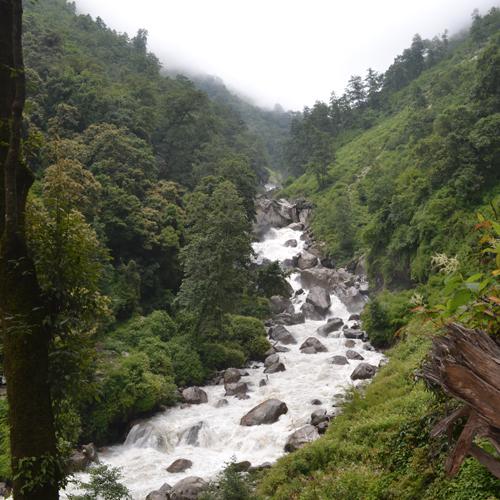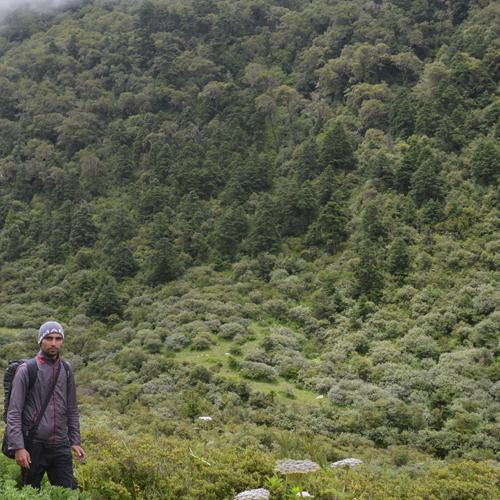Mitra Pandey
The Himalayan musk deer is rapidly declining and gravely threatened with extinction due to poaching activities in Nepal including Langtang National Park (LNP). The poachers kill the adult male as it bears musk pod which has high demand across the globe to prepare high-quality perfumes and medicine. The killings of adult male adversely impact the population structure of the musk deer and lead the species to extinction. So, it is very urgent to mitigate this poaching threat for the existence of musk deer particularly in Langtang National Park due to its accessible and trans-boundary location to the major cities.

Musk deer habitat. ©Mitra Pandey.
Himalayan musk deer (Moschus chrysogaster) is an ‘Endangered’ species recorded from China, Nepal, Bhutan and India at the altitudinal range of 2,000-5,000 m asl. The species is found in the sub-alpine and alpine region of Nepal and has experienced massive threat because of the musk pod possessed predominantly by matured males. The poachers hunt and kill the animal just for few grams of musk it produces. The collected musk has been a trading commodity for cosmetic and pharmaceutical use in the international market. The high-priced musk has led poacher to over-exploit the species causing steep population decline. Livestock depredation, over-grazing, forest fire, human encroachment for firewood and NTFPs collection are additional threats, however, poaching activity has drawn high attention of many conservationists. This project is focused on the musk deer of Langtang National Park (LNP) that are in danger of local extinction prominently due to poaching for its musk pods. For this reasons, we have planned to carry out the anti-poaching activities for protecting the musk deer and recommended for adopting urgent mitigation measures of this poaching threat to ensure the survival of the deer in the park.

Musk Deer Habitat in the background.
This project targets local community people, park rangers and game-scouts, armed police force, hunters/poachers and traders, buffer zone user committee and school students to curb poaching activities in LNP. Involving local community to detect wildlife crime is the key step for species protection. Traps, leg snares and barricade snares will be collected and dismantled jointly with local people. Trade routes adopted by the poachers will be identified and mapped through the questionnaire survey with park warden, security police officer, ex-hunters and traders. Musk deer conservation workshop will be organized for park rangers, game-scouts and security police personnel to reduce poaching and the illegal trade. Awareness programme against poaching will be conducted to reach to existing buffer zone user committees, school students and hunters/poachers. The workshop and awareness programs make the participants able to be alert against the intruders and poachers roaming around the musk deer habitat and nearby settlements, and help the park rangers and security personnel with information about such suspected people and wildlife crime activities. Wildlife laws and policy will be delivered to motivate the local hunters to abandon their hunting profession and encourage them to engage in other business. It has been expected to make the park safe habitat for musk deer and other threatened wild animal after the implementation of this project.